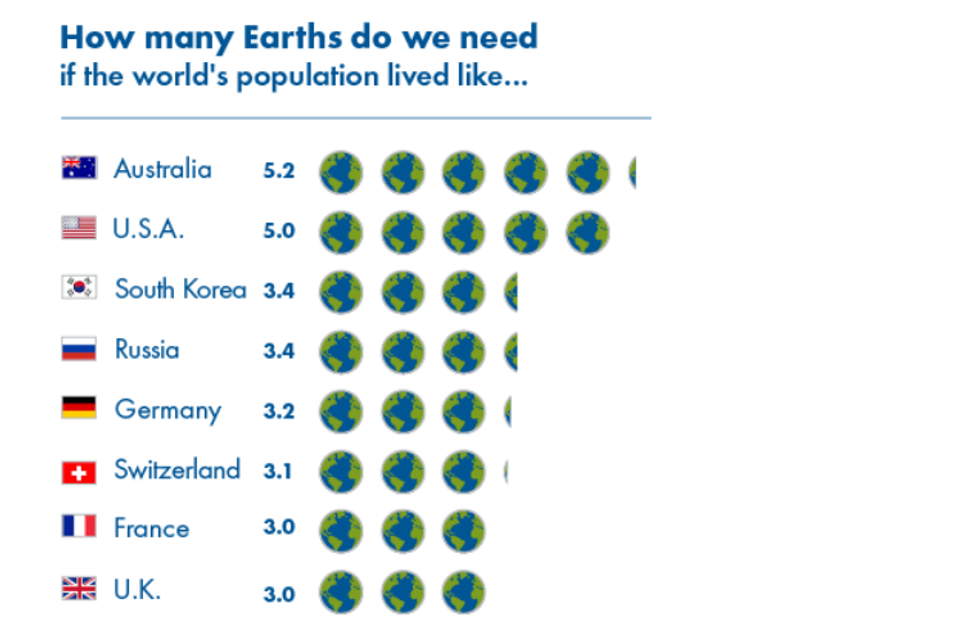

SUBSCRIBE TO OUR FREE NEWSLETTER
Daily news & progressive opinion—funded by the people, not the corporations—delivered straight to your inbox.
5
#000000
#FFFFFF
To donate by check, phone, or other method, see our More Ways to Give page.


Daily news & progressive opinion—funded by the people, not the corporations—delivered straight to your inbox.

"This means that in seven months, we emitted more carbon than the oceans and forests can absorb in a year, we caught more fish, felled more trees, harvested more, and consumed more water than the Earth was able to produce in the same period," World Wildlife Fund and Global Footprint Network said in a statement. (Photo: Guy Gorek/Flickr/cc)
With several months left until the end of 2017, humans have already used up more natural resources than the planet can regenerate in a year, making today Earth Overshoot Day. For the rest of the year, humanity is "living on credit."
"Humanity's carbon footprint alone more than doubled since the early 1970s."
--Mathis Wackernagel, Global Footprint Network
"This means that in seven months, we emitted more carbon than the oceans and forests can absorb in a year, we caught more fish, felled more trees, harvested more, and consumed more water than the Earth was able to produce in the same period," World Wildlife Fund and Global Footprint Network said in a statement.
"The costs of this global ecological overspending are becoming increasingly evident around the world," the groups added, "in the form of deforestation, drought, fresh-water scarcity, soil erosion, biodiversity loss, and the buildup of carbon dioxide in the atmosphere."
Last year, Earth Overshoot Day fell on August 8, an indication that the world's population is accelerating the pace with which it blows through the planet's annual resource budget from year to year.
When viewed over the longer-term--Earth Overshoot Day has been marked annually since 1983--the acceleration becomes even more glaring.
\u201cThe Earth is exhausted - we're using up its resources faster than it can provide https://t.co/ASZ6IinQ4F #EarthOvershootDay\u201d— DW News (@DW News) 1501682221
According to environmental groups and climate scientists, Earth Overshoot Day is just one of many urgent indicators that only rapid and systemic restructuring of our energy systems can reverse the trends that continue to deplete and degrade the planet.
"Humanity's carbon footprint alone more than doubled since the early 1970s and remains the fastest growing component of the widening gap between the Ecological Footprint and the planet's biocapacity," Mathis Wackernagel, CEO of Global Footprint Network, said in a statement. "To achieve the goals of the Paris Climate Accord, humanity would need to exit the fossil fuel economy before 2050."
But recent moves by U.S. President Donald Trump have significantly undercut hopes that the global community can work together to accomplish this necessarily ambitious transformation.
"Imperfect as it may be, the Paris Climate Accord generated global goodwill and hope that humanity was ready at last to tackle its biggest challenge yet," writes The Telegraph's Patrick Scott. "However, the deal suffered a huge blow in June when Trump announced his plans to withdraw from the agreement."
According to the Global Footprint Network, if everyone lived like the U.S. population, we would need five Earths to sustain the level of consumption.

Trump and Musk are on an unconstitutional rampage, aiming for virtually every corner of the federal government. These two right-wing billionaires are targeting nurses, scientists, teachers, daycare providers, judges, veterans, air traffic controllers, and nuclear safety inspectors. No one is safe. The food stamps program, Social Security, Medicare, and Medicaid are next. It’s an unprecedented disaster and a five-alarm fire, but there will be a reckoning. The people did not vote for this. The American people do not want this dystopian hellscape that hides behind claims of “efficiency.” Still, in reality, it is all a giveaway to corporate interests and the libertarian dreams of far-right oligarchs like Musk. Common Dreams is playing a vital role by reporting day and night on this orgy of corruption and greed, as well as what everyday people can do to organize and fight back. As a people-powered nonprofit news outlet, we cover issues the corporate media never will, but we can only continue with our readers’ support. |
With several months left until the end of 2017, humans have already used up more natural resources than the planet can regenerate in a year, making today Earth Overshoot Day. For the rest of the year, humanity is "living on credit."
"Humanity's carbon footprint alone more than doubled since the early 1970s."
--Mathis Wackernagel, Global Footprint Network
"This means that in seven months, we emitted more carbon than the oceans and forests can absorb in a year, we caught more fish, felled more trees, harvested more, and consumed more water than the Earth was able to produce in the same period," World Wildlife Fund and Global Footprint Network said in a statement.
"The costs of this global ecological overspending are becoming increasingly evident around the world," the groups added, "in the form of deforestation, drought, fresh-water scarcity, soil erosion, biodiversity loss, and the buildup of carbon dioxide in the atmosphere."
Last year, Earth Overshoot Day fell on August 8, an indication that the world's population is accelerating the pace with which it blows through the planet's annual resource budget from year to year.
When viewed over the longer-term--Earth Overshoot Day has been marked annually since 1983--the acceleration becomes even more glaring.
\u201cThe Earth is exhausted - we're using up its resources faster than it can provide https://t.co/ASZ6IinQ4F #EarthOvershootDay\u201d— DW News (@DW News) 1501682221
According to environmental groups and climate scientists, Earth Overshoot Day is just one of many urgent indicators that only rapid and systemic restructuring of our energy systems can reverse the trends that continue to deplete and degrade the planet.
"Humanity's carbon footprint alone more than doubled since the early 1970s and remains the fastest growing component of the widening gap between the Ecological Footprint and the planet's biocapacity," Mathis Wackernagel, CEO of Global Footprint Network, said in a statement. "To achieve the goals of the Paris Climate Accord, humanity would need to exit the fossil fuel economy before 2050."
But recent moves by U.S. President Donald Trump have significantly undercut hopes that the global community can work together to accomplish this necessarily ambitious transformation.
"Imperfect as it may be, the Paris Climate Accord generated global goodwill and hope that humanity was ready at last to tackle its biggest challenge yet," writes The Telegraph's Patrick Scott. "However, the deal suffered a huge blow in June when Trump announced his plans to withdraw from the agreement."
According to the Global Footprint Network, if everyone lived like the U.S. population, we would need five Earths to sustain the level of consumption.

With several months left until the end of 2017, humans have already used up more natural resources than the planet can regenerate in a year, making today Earth Overshoot Day. For the rest of the year, humanity is "living on credit."
"Humanity's carbon footprint alone more than doubled since the early 1970s."
--Mathis Wackernagel, Global Footprint Network
"This means that in seven months, we emitted more carbon than the oceans and forests can absorb in a year, we caught more fish, felled more trees, harvested more, and consumed more water than the Earth was able to produce in the same period," World Wildlife Fund and Global Footprint Network said in a statement.
"The costs of this global ecological overspending are becoming increasingly evident around the world," the groups added, "in the form of deforestation, drought, fresh-water scarcity, soil erosion, biodiversity loss, and the buildup of carbon dioxide in the atmosphere."
Last year, Earth Overshoot Day fell on August 8, an indication that the world's population is accelerating the pace with which it blows through the planet's annual resource budget from year to year.
When viewed over the longer-term--Earth Overshoot Day has been marked annually since 1983--the acceleration becomes even more glaring.
\u201cThe Earth is exhausted - we're using up its resources faster than it can provide https://t.co/ASZ6IinQ4F #EarthOvershootDay\u201d— DW News (@DW News) 1501682221
According to environmental groups and climate scientists, Earth Overshoot Day is just one of many urgent indicators that only rapid and systemic restructuring of our energy systems can reverse the trends that continue to deplete and degrade the planet.
"Humanity's carbon footprint alone more than doubled since the early 1970s and remains the fastest growing component of the widening gap between the Ecological Footprint and the planet's biocapacity," Mathis Wackernagel, CEO of Global Footprint Network, said in a statement. "To achieve the goals of the Paris Climate Accord, humanity would need to exit the fossil fuel economy before 2050."
But recent moves by U.S. President Donald Trump have significantly undercut hopes that the global community can work together to accomplish this necessarily ambitious transformation.
"Imperfect as it may be, the Paris Climate Accord generated global goodwill and hope that humanity was ready at last to tackle its biggest challenge yet," writes The Telegraph's Patrick Scott. "However, the deal suffered a huge blow in June when Trump announced his plans to withdraw from the agreement."
According to the Global Footprint Network, if everyone lived like the U.S. population, we would need five Earths to sustain the level of consumption.
